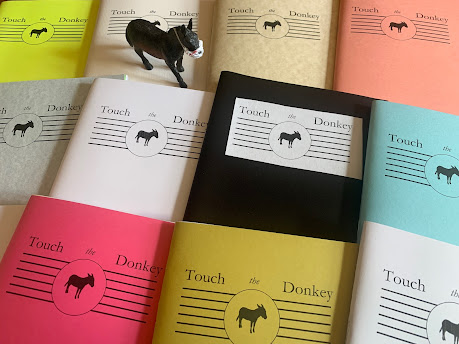There’s so much going on! There’s even a reading on Thursday in Ottawa with three above/ground press poets—Stuart Ross, William Vallières and Jessi MacEachern—hosted by Bardia Sinaee. And you saw the big above/ground press 30th anniversary fundraiser, happening right now? Or the fact that the spring edition of the ottawa small press book fair is coming up in a couple of weeks? And don't forget my enormously clever substack, where I'm working on one or two or three ongoing non-fiction projects. So many things!
Montreal QC: I was first directed to Montreal poet and editor/publisher (Columba) Emily Tristan Jones’ chapbook debut, HAND (Cactus Press, 2023) thanks to Hugh Thomas, who offered her as a poet worth paying attention to. I’m intrigued by the curious patterns of her lyric, and intrigued at the fact that she has a full-length debut, Buttercup, out next year with an unnamed press (at least according to her biography in this particular title) in Chicago. “A crow, inserting its hands into the air,” she writes, to open the poem “CROWNLAND,” “descends / by my human head / to low red shrubs [.]” The narratives of her scenes unfold across narratives of straight lines and deflections (the Blomidon and Bay of Fundy references I quite enjoyed, having experienced such myself), even through the fact of a chapbook titled HAND that bears the cover illustration of a foot: one thing is not necessarily another, aiming instead for the ways in which these thoughts connect. The poems are playful, specific and simultaneously tethered and untethered to the ground, akin to a kite. “My whole body, like a skeleton, music in the air,” she writes, early on in the collection. I am interested to see what her work is able to accomplish through this forthcoming debut, across a wider, broader canvas.
~
A large number of my thoughts were broadcast in the woods
I ran in every direction,
leaving little to the imagination
I was like a racehorse. The
wind whistled behind me
Animals whistled behind
me
I was a free man
My soul fanned like the
hair on the body of a wild thing
Philadelphia PA: Further to Brian Teare’s remarkable chapbook series through his Albion Books is Carolina Ebeid’s latest, DAUERWUNDER (2023), subtitled “a brief record of facts,” published as the fourth title in Albion’s series eight [see my reviews of 8.1 here, 8.2 here and 8.3 here]. The poems collected here are set, or tethered, between two words—“WINTERNET” and “TRANSGRACE”—and employ a sequence of an exploration around the accidents of language that technology spark. She writes of the glitch, of audio, text and meaning (something east coast poet Lance La Rocque explored as well from a different angle, across his chapbook glitch a few years back), from the literal glitch of audio to the recombinative. She explores the elements of what remains and what is rebuilt, reconstituted; she writes of telepathy, telephone calls and the “Hollow of a torso”; she writes of what is left behind, lost or added, from digital recordings to “something about our / neighborhood dust [.]” As she writes, mid-way through the collection: “how do you know you are remembering / an event or remembering the pictures of / an event, do your dream in the first or / third person?”
“Attention” as an imperative but without exclamations, the way one lowers her voice in the sensitive part of conversation making you lean in. “Attention, taken to its highest degree, is the same thing as prayer” (Simone Weil).
Brooklyn NY: I’m only slowly engaging with the work of New York poet Jordan Davis, having produced a chapbook of his through above/ground press (full disclosure, naturally), and now through the publication of his Hidden Poems (If A Leaf Falls Press, 2022), a small chapbook of sixteen short poems produced in an edition of one hundred copies. I’ve always been a bit envious of those poets working in miniature, from Nelson Ball to Mark Truscott to Cameron Anstee, for the possibilities that can exist in small spaces. Through Davis, the short form is less a compact form of held meaning, as in the works of those three examples, but as poems composed as pieces that exist beyond the boundaries of a single moment. Some poems here are akin to a wave of the hand, suggesting but part of an unseen and far larger space, or as accumulations of phrases that mangle and mix in the imagination, offering something far else. These are poems of possibility, including what might fall into contradiction, across what might otherwise be impossible. His directions are as evident as through the opening poem, that reads, in full:
BAD POEM
Put that rock down



No comments:
Post a Comment